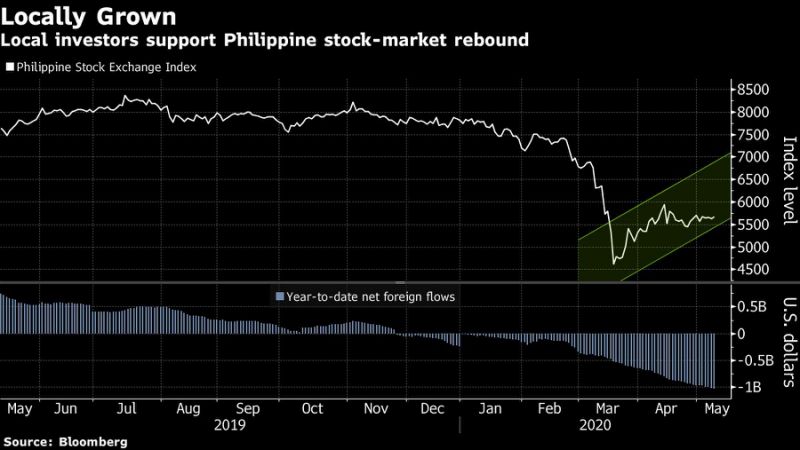(Bloomberg) — Follow Bloomberg on LINE messenger for all the business news and analysis you need.
Emil Ongchuan’s restaurant in Manila had to shut most of its operations during the regional lockdown. With little revenue coming in, the 29-year-old started investing in the stock market to make more money.
After opening an account with COL Financial Group Inc., the newbie trader combed through online forums for tips on how to trade and read financial statements. Like him, many in the Philippines are taking up equity trading for the first time as social-distancing rules keep them at home.
At AAA Southeast Equities Inc., the number of customers opening accounts has doubled since the lockdown started in the Philippines’ main Luzon island in mid-March, President William Matthew Cabangon said. Conrado Bate, the chief executive officer of COL Financial, one of the most popular online brokerage platforms in the country, said he’s seen a “significant” increase in retail investors activating dormant accounts and topping up investments.
“People are stuck at home, and the stock market is one of the few things that remain open,” Cabangon said. “When they hear that the stock market is falling, they get curious.”
Unfazed with a 28% tumble in the benchmark Philippine equity index that’s turned it into one of the world’s worst this year, local investors are jumping in to ride what they hope will be a strong rebound, even as foreign funds flee. Valuations have become cheaper, about a quarter below their five-year average.
“This is the opportunity many people are waiting for,” Bate said.
Ongchuan began by investing 3,000 pesos ($60) in March, buying stocks in builders Ayala Land Inc. and SM Prime Holdings Inc. after the lockdown shut their malls and sent their shares crashing. As he grows more comfortable with the market, he plans to raise that amount to more than 100,000 pesos. “I have the time now to focus on day trading but when the lockdown is lifted, I’ll definitely be changing my strategy to something more long term,” he said.
Equity trading has surged since mid-March, with the number of shares in the Philippine Stock Exchange Index changing hands jumping by 45% from the average in the previous year — more than the 32% increase in volume for companies in the regional MSCI Asia Pacific Index, data compiled by Bloomberg show. Boosted by local investors, the Philippine benchmark gauge has rebounded 22% from a low in March, even as foreign outflows accelerated to more than $1 billion this year.
Young professionals have driven the spike in account openings at COL Financial, Bate said, sustaining a trend in recent years. The firm had more than 330,000 investors and 72 billion pesos in client assets as of the end of last year. For AAA Equities, many of its new clients are overseas workers, Cabangon said. Both brokers said they benefit from an all-digital registration process as the local lockdown has shut most banks and offices.
The surge in stock-market accounts has been led by those for online trading, which jumped 61% in 2018, according to the latest available data from the Philippine Stock Exchange. With only 1% of the nation’s population invested in the local bourse, regulators have long sought to improve investment literacy among Filipinos to help deepen financial markets.
Betting on equities during a pandemic can require some “hand-holding,” especially since first-time investors can get spooked by market volatility, Bate said. COL Financial is organizing webinars for new clients offering advice from analysts, while AAA Equities is launching YouTube tutorials.
“The most common question we get is: Is this the right time to buy?” Bate said. “And we say, we don’t know if this the bottom but if you’re in here for the long run, you have a greater chance of benefiting once this crisis is resolved.”
(Updates with Tuesday market moves in fifth, eighth paragraphs)
<p class="canvas-atom canvas-text Mb(1.0em) Mb(0)–sm Mt(0.8em)–sm" type="text" content="For more articles like this, please visit us at bloomberg.com” data-reactid=”55″>For more articles like this, please visit us at bloomberg.com
<p class="canvas-atom canvas-text Mb(1.0em) Mb(0)–sm Mt(0.8em)–sm" type="text" content="Subscribe now to stay ahead with the most trusted business news source.” data-reactid=”56″>Subscribe now to stay ahead with the most trusted business news source.
©2020 Bloomberg L.P.













Add Comment